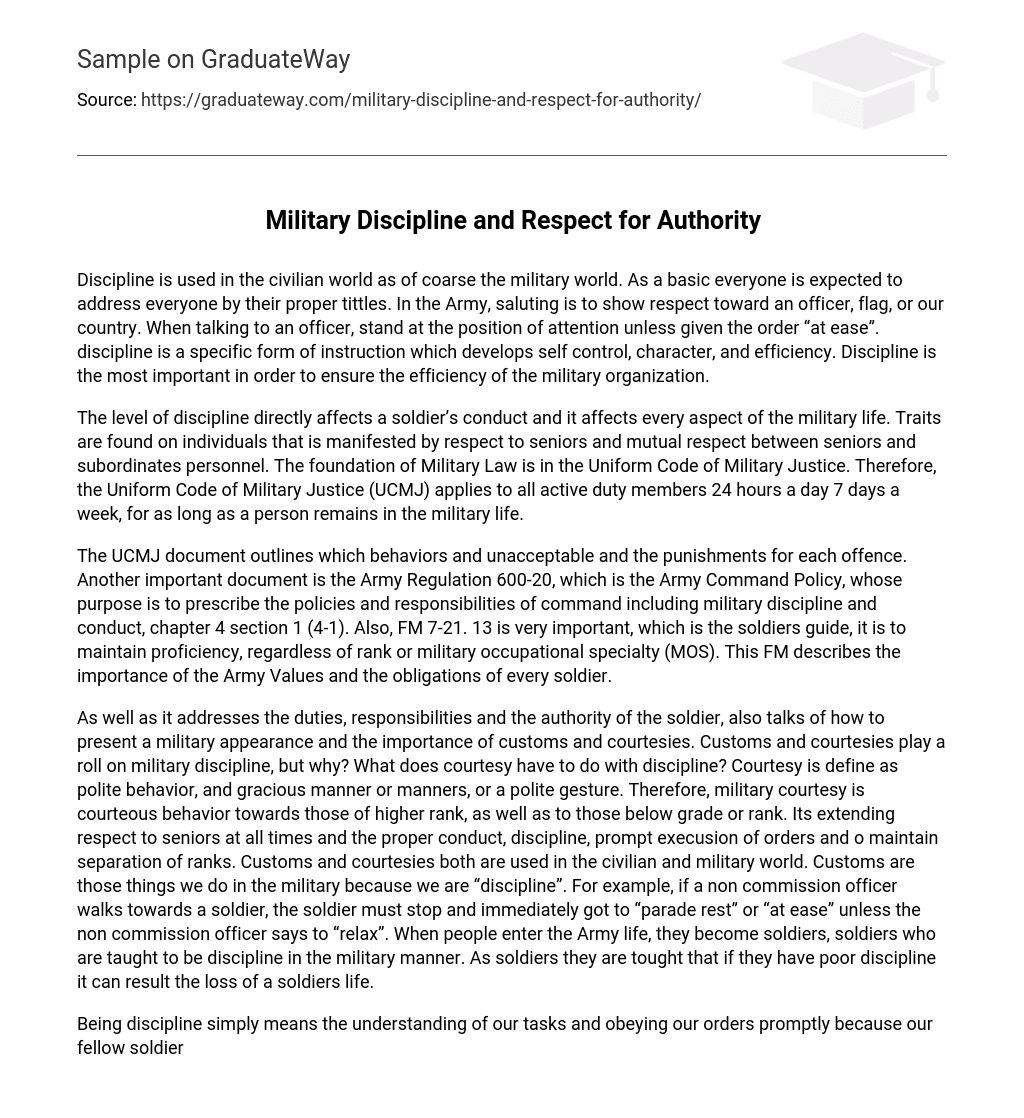Discipline is essential in both the civilian and military world. It is expected that everyone addresses others by their proper titles. In the Army, saluting is a way of showing respect towards officers, the flag, or our country. When conversing with an officer, one should stand at attention unless instructed otherwise. Discipline is a type of instruction that fosters self-control, character, and efficiency. It is crucial for maintaining the efficiency of military organizations.
The conduct of a soldier and all aspects of military life are affected by the degree of discipline. This degree is determined by characteristics such as reverence for superiors and reciprocal respect between superiors and subordinates. The Uniform Code of Military Justice (UCMJ) acts as the basis for Military Law, which applies to all active duty members during their time in the military.
The UCMJ document details the behaviors that are considered unacceptable and the corresponding punishments for each offense. Another crucial document is the Army Regulation 600-20, known as the Army Command Policy, which aims to establish the policies and responsibilities of command, including military discipline and conduct, specifically outlined in chapter 4 section 1 (4-1). Additionally, FM 7-21.13 holds great significance as it is the soldiers guide that stresses the need to maintain proficiency, regardless of rank or military occupational specialty (MOS). This FM provides insights into the Army Values and outlines the obligations of every soldier.
The text explores the obligations, duties, and authority of soldiers, as well as the importance of military appearance and traditions. Customs and courtesies play a crucial role in maintaining military discipline. Courteous behavior encompasses politeness and gracious manners, including polite gestures. In the military, courtesy entails treating those with higher rank or lower grade respectfully, adhering to proper conduct, promptly following orders, and upholding rank distinctions. Both civilian and military realms observe customs and courtesies. These practices within the military serve to demonstrate discipline. For instance, when a non-commissioned officer approaches a soldier, the soldier must immediately halt and assume “parade rest” or “at ease,” unless instructed otherwise. Soldiers undergo training to instill discipline in them upon joining the Army. Neglecting discipline can result in severe consequences, potentially even costing a soldier’s life.
Being disciplined means understanding our tasks and obeying orders promptly because our fellow soldiers and leaders rely on us. The purpose of discipline is to ensure we are well-trained soldiers, wearing our uniform correctly, following orders, and completing tasks accurately. Disciplinary actions can include saluting and using proper titles such as SGT, SSG, SIR, MAM, etc. Discipline is not only about following orders or administering punishments for mistakes but is a shared foundation built by leaders and soldiers.
Discipline is the inclination to behave correctly even when facing challenges. It is the drive to complete a task with excellence, not out of fear of punishment, but out of self-pride. The confidence to act appropriately in stressful situations is derived from discipline acquired through soldier training. A disciplined unit consists of well-prepared soldiers who have faith in one another and believe they can succeed in any assignment. Ultimately, discipline serves as a beneficial attribute that safeguards us from harm and devastation.
Discipline can be defined as the training that is intended to develop a particular character or behavior, particularly training that leads to moral or mental improvement. It is also a methodical approach to achieving obedience. Every soldier is assessed on their discipline to withstand the demanding demands of long hours of laborious work, as well as their social discipline to conform and behave within a community that upholds strict standards. Each individual is born with some level of thinking and reasoning abilities, and exercising sound judgment requires a disciplined mind.
Having maturity and wise discernment is the basis for being prepared and having the ability to make difficult choices. When someone enlists in the military, they commit to following the orders of the President of the United States and assigned officers in accordance with regulations and the Uniform Code of Military Justice. As a result, it is crucial for soldiers to prioritize military discipline as a way to show respect towards superiors like the Chain of Command or Non Commission Officer Support Channel.
The Chain of Command serves two purposes: to show respect to senior personnel and to maintain the organization’s integrity. The Non Commission Officer Support Channel is a subordinate channel that supports the Chain of Command. It is responsible for carrying out orders and completing tasks. The Chain of Command holds legal responsibility for training, discipline, and welfare. Discipline is a form of respect, which is one of the Army Values – treating people as they deserve.
To earn respect, it is important for an individual to always recognize the worth of others, display thoughtfulness and courtesy, appreciate differences, and refrain from exploiting their power over others. Respect should be granted to individuals based on their character rather than solely their position. Furthermore, integrity is highlighted as a key value within the Army. This encompasses consistently choosing the morally and legally correct course of action, even if there are personal sacrifices involved. It upholds a firm set of ethical principles and entails abstaining from wrongdoing while defending what is right!





